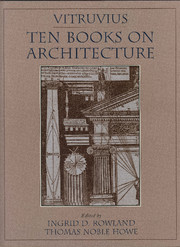Book contents
- Frontmatter
- Dedication
- Contents
- Acknowledgments
- List of Illustrations
- Translator's Preface
- Illustrator's Preface
- VITRUVIUS
- INTRODUCTION
- LIST OF MANUSCRIPTS SEEN
- THE TRANSLATION
- Book 1 First Principles and the Layout of Cities
- Book 2 Building Materials
- Book 3 Temples
- Book 4 Corinthian, Doric, and Tuscan Temples
- Book 5 Public Buildings
- Book 6 Private Buildings
- Book 7 Finishing
- Book 8 Water
- Book 9 Sundials and Clocks
- Book 10 Machines
- COMMENTARY
- Index
Book 6 - Private Buildings
Published online by Cambridge University Press: 18 December 2014
- Frontmatter
- Dedication
- Contents
- Acknowledgments
- List of Illustrations
- Translator's Preface
- Illustrator's Preface
- VITRUVIUS
- INTRODUCTION
- LIST OF MANUSCRIPTS SEEN
- THE TRANSLATION
- Book 1 First Principles and the Layout of Cities
- Book 2 Building Materials
- Book 3 Temples
- Book 4 Corinthian, Doric, and Tuscan Temples
- Book 5 Public Buildings
- Book 6 Private Buildings
- Book 7 Finishing
- Book 8 Water
- Book 9 Sundials and Clocks
- Book 10 Machines
- COMMENTARY
- Index
Summary
PREFACE
1. When Aristippus,* the Socratic philosopher, had been washed up on the shore of Rhodes after a ship-wreck, and noticed that geometric diagrams had been drawn there, he is said to have exclaimed to his comrades: “Let us hope for the best; I see human footprints” and forthwith he headed for the city of Rhodes. He came straight upon the gymnasium, and after discussing philosophy there was rewarded with gifts sufficient not only to outfit himself, but also to allow him to provide clothing and the other necessities of life to those who were with him. When later his companions wanted to return home, they asked him what messages he would like to have relayed back. This, then, is what he ordered them to report: that children should be furnished with the sort of possessions and travel money that can even survive a shipwreck in one piece.
2. For the real safeguards of life are those that neither the cruel storm of fortune nor political change nor the ravages of war can harm. Taking the same argument further, Theophrastus* put it this way, when he urged that people be well educated rather than relying on money: an educated person is the only one who is never a stranger in a foreign land, nor at a loss for friends even when bereft of household and intimates. Rather, he is a citizen in every country, and may look down without fear on the difficult turns of fortune. He, however, who thinks that he is fortified by the defenses of good fortune rather than learning will find himself a wanderer on shifting pathways, beleaguered by a life that is never stable, but always wavering.
3. Indeed, Epicurus says much the same thing: that fortune grants very little to wise men, but what she does grant are those gifts that are greatest and most necessary, namely to be governed by the contrivances of mind and imagination. Many other philosophers have said exactly the same things.
- Type
- Chapter
- Information
- Vitruvius: 'Ten Books on Architecture' , pp. 75 - 84Publisher: Cambridge University PressPrint publication year: 1999



